MYTHS ABOUT WHO BECOMES A TERRORIST
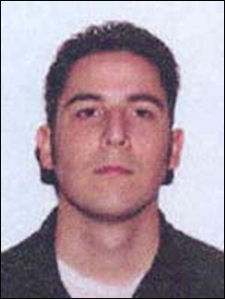
Daniel Andreas San Diego
FBI Most Wanted Terrorist No. 3 in 2012Jessica Stern wrote in the Washington Post: By now “we should be better at plucking a terrorist out of an airport security line. After all, we have some idea of what he'll be like: young, socially alienated and deeply religious. And he'll come from a country like Afghanistan, Algeria, Cuba, Iran, Iraq, Lebanon, Libya, Nigeria, Pakistan, Saudi Arabia, Somalia, Sudan, Syria or Yemen. (Under new Transportation Security Administration rules announced last weekend, people bearing passports from these 14 countries will undergo special scrutiny before boarding a plane.)Or will he? What if he comes from Northern Virginia, like the five young men who were arrested in Pakistan in 2009 8 and who have been accused of planning "terrorist activities," according to Pakistani newspaper reports? The bottom line is that we can no longer assume that terrorists will come from any particular country or fit any particular profile. The more we learn about what makes people vulnerable to recruitment by terrorist organizations, the less any of the old generalizations hold up. [Source: Jessica Stern, Washington Post , January 10, 2010; Stern serves on the Hoover Institution Task Force on National Security and Law and is a lecturer at Harvard Law School. She is the author of "Terror in the Name of God: Why Religious Militants Kill."]
On the belief that most terrorists are spoiled rich kids, Stern wrote: “Many prominent jihadists are indeed well off and well educated. Umar Farouk Abdulmutallab, the suspect in the failed Christmas Day airline bombing, comes from one of the wealthiest families in Nigeria. After the 2001 attacks, much was made of the engineering backgrounds of some of the hijackers, and Osama bin Laden famously hails from a wealthy family with close ties to the Saudi royals. But terrorists come from all socioeconomic backgrounds. For poor people in countries where economic prospects are bleak, jihad can be one of the few jobs available. Of the 25,000 insurgents and terrorism suspects detained by U.S. forces in Iraq as of 2007, nearly all were previously underemployed, according to Maj. Gen. Douglas Stone, the commander of detainee operations at the time. And according to Christopher Boucek of the Carnegie Endowment, the Saudi Interior Ministry found that most of the 639 convicted terrorists going through a rehabilitation program came from lower- or middle-class families, while 3 percent had high-income backgrounds.
On the assumption that terrorists are motivated by a strong belief in their cause, Stern wrote: “Terrorist movements often arise in reaction to a perceived injustice, whether real or imagined. Yet ideology is not the only, or even the most important, factor in an individual's decision to join. In my research and interviews with terrorists, I have found that operatives are often more interested in adopting a new identity than in supporting a terrorist group's stated goals. Many speak, in particular, about being motivated by a feeling of humiliation. A Kashmiri militant founded his group because, he said, "Muslims have been overpowered by the West. Our ego hurts . . . we are not able to live up to our own standards for ourselves."

Hasan Izz-Al-Din
FBI Most Wanted Terrorist No. 2 The reasons that some people become terrorists are as varied as the reasons that others choose conventional professions: market conditions, social networks, contact with recruiters, education and individual preferences. And just as the passion for justice that may animate a young law student is not necessarily what keeps him working long hours at a law firm while hoping to make partner, a terrorist's motivations for staying with his cause can also change. Most terrorist groups disappear quickly; those that survive tend to have the sort of flexible ideology that can attract a diverse array of recruits and funders. Al-Qaeda is among the most disciplined terrorist groups, but its goals and its list of enemies are constantly shifting. Documents analyzed by scholars at the Combating Terrorism Center at the U.S. Military Academy reveal an astonishing lack of clarity about the group's purpose, even among leaders of the organization. Abu'l-Walid, a leading strategic thinker for al-Qaeda, has complained about constantly shifting strategic goals, lamenting that "waging jihad like a rhinoceros is stupid and futile."
On whether it is true that the typical terrorist recruit is an alienated loner, stern wrote: According to The Washington Post, Abdulmutallab, the alleged Christmas airplane attacker, wrote in an online Islamic forum: "I have no one . . . to consult, no one to support me and I feel depressed and lonely. I do not know what to do. And then I think this loneliness leads me to other problems." But for most terrorist recruits, the problem isn't so much a lack of friends as the wrong friends. This dynamic isn't so different from the way gang recruiting works in the United States: Terrorists often join an armed struggle because they have a buddy who has done so. In a survey of 516 Guantanamo detainees, researchers at the Combating Terrorism Center found that knowing another member of al-Qaeda was a better predictor of who became a terrorist than was belief in the idea of jihad.
It is interesting to note that in its rehabilitation efforts, the Saudi government tries to compete with convicts' ties to terrorism networks by reconnecting them to their families and home communities, and most controversially, by trying to find wives for the former fighters. Ultimately, some individuals may join terrorist groups out of a misplaced desire to transform society. But over time, the social and psychological rewards of belonging can eclipse such motivations. Terrorists want to better their own circumstances at least as much as they want to change the world.
Nice Guys More Likely Than Sociopaths to Become Violent Jihadis

Ibrahim Salih
Mohammed Al-Yacoub
FBI Most Wanted Terrorist No. 1 Aryn Baker wrote in Time: “Ahmed Omar Saeed Sheikh was the kind of guy you could have taken home to mom. Smart and friendly, he once jumped in front of a train in a London tube station to rescue a fallen commuter. But he also, in the name of the Islamist cause, gleefully threatened a hostage with decapitation in 1994. That hostage survived, but Danny Pearl, the Wall Street Journal Pakistan correspondent whom Sheikh is charged with kidnapping in January 2002, did not.... How does someone like Sheikh — "the kindest, most gentle person you could meet," according to his brother — turn terrorist? [Source: Aryn Baker, Time, March 20, 2008; “Leaderless Jihad” by Marc Sageman ]
“In “Leaderless Jihad” , the latest book by the author of 2004's Understanding Terror Networks, forensic psychiatrist Marc Sageman attempts to unravel the psychological profile of Islamist terrorists. Like his earlier book, Leaderless Jihad discredits conventional wisdom about terrorists by eschewing anecdotes and conjecture in favor of hard data and statistics. And statistically, the enemy is us. "It is easy to view terrorists as alien creatures who exist outside normal patterns of social interaction," he writes. But the sobering reality is that they don't. Sociopaths do not make capable terrorists — they seldom take orders and are rarely willing to sacrifice their lives for a larger goal. Many terrorists on the other hand, share qualities with ordinary, law-abiding people: they can be cooperative, goal-orientated and intelligent, even if emotionally wrought. Often, the start of their radicalization can be traced to a scrupulously moral outrage — not an irrational hatred or base prejudice.”
Radical Muslims become bombers, Sageman argues, when the causes of their anger — the Israeli occupation of Palestine, the U.S. invasion of Iraq — come to be perceived as part of a general war against Islam. The feeling of being under attack may be amplified by personal experience of discrimination, and then validated by exchanges with like-minded friends, family members and Internet users, before being converted into action by "al-Qaeda." Not, as Sageman puts it, "al-Qaeda Central" (made up of those who have sworn an oath of loyalty to Osama bin Laden), but al-Qaeda the informal network, mobilizing radicalized Islamists around the world without any contact with bin Laden at all.
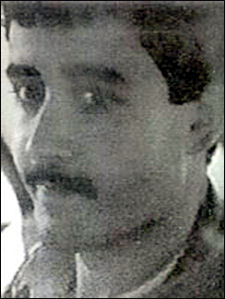
Ali Atwa, No. 4
FBI Most Wanted Terrorist
“Poverty and lack of opportunity are not necessarily the factors that drive young men to commit violence in its name. Middle-class and educated at a private school, Sheikh exemplifies another kind of motivation. "They view themselves as warriors willing to sacrifice themselves for the sake of building a better world," Sageman explains, "and this gives meaning to their lives." They are also younger and less visible, blending in with the Western societies they grew up in. Because of security crackdowns, they are unable to reach out to al-Qaeda's original leadership but they can access jihadi Internet forums for guidance and bombmaking expertise. The Madrid train bombings of 2004, which killed 191 commuters, are an example of an atrocity committed by such young men. The attacks were an "offering to al-Qaeda Central leaders for ... admission into the ranks of global Islamist terrorism," Sageman writes.
The solution to Islamic terrorism, as the author sees it, is genuine peace in Palestine and an immediate U.S. withdrawal from Iraq, depriving jihadis of their ability to wage a moral war. "The presence of even one American soldier ... will trump any goodwill policy the United States attempts to carry out in the Middle East." He also recommends an end to the offering of rewards, publication of "most wanted" lists and staging of press conferences to proclaim the capture of top terrorists, since jihadis regard all these as badges of honor. It would be better, Sageman says, to treat terrorists like common criminals.
Weak Identity of Muslim Immigrants Linked with Jihadism
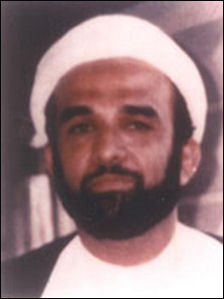
Abdelkarim Hussein
Mohamed Al-nasser
FBI Most Wanted Terrorist No. 5 Ayaan Hirsi Ali has argued that he "dysfunctional" aspect of families and communities makes young Muslim men, particularly those within immigrant communities in the West, "susceptible" to the jihadist siren. Ali told Global Viewpoint: “Every experience, of course, and every family, is different. But what I noticed in Europe when visiting the communities of the Muslim families trying to assimilate was a weak identity among the kids, the same thing I witnessed within my own extended family. Whether immigrants in modern Europe, or clans faced with the challenges of modernization in their homeland, the issues are the same. [Source: Ayaan Hirsi Ali, Global Viewpoint, June 8, 2010. Ali is a Somali-born women's rights advocate, is the author of "Infidel" and a new memoir, "Nomad: A Personal Journey Through the Clash of Civilizations”]
“This weak identity I saw in immigrant families is caused by an uncertainty in young people, particularly boys, about where exactly they belong - here, where they have emigrated, or there where they came from? If they are back home, are they in a tribe going nowhere as the world moves on? I remember well the kids from Morocco, who went swaggering about Amsterdam emphasizing their "otherness" as a way of compensating for not being accepted. But when they would go back to Morocco, they were not accepted by Moroccans either. So there, too, they were also emphasizing how different they were.
‘so, these kids hang out, feel warm and secure together. They have an acute sense they don't belong anywhere else except with themselves. Back before jihadism was a threat, the ambitious boys among them would disappear into drug cartels or petty-crime rings. The less ambitious would turn to some form of welfare. In Africa, it was clan or tribe welfare. In Europe, it was government welfare. But now, the jihadists have become important recruiters of these boys with weak identities. They seek to bring them into the fold and offer them strong identities as Muslims fighting against the siege of their culture.
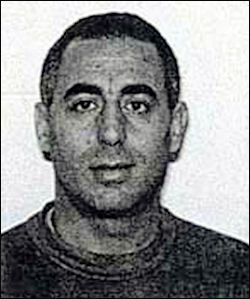
Mohammed Ali Hamadei
FBI Most Wanted Terrorist No. 6 “When I read books like Sadanand Dhume's "My Friend the Fanatic" about his travels around Indonesia, I see the same thing. When Dhume's friend takes him around to meet the "brotherhood" or Al-Qaeda types, he notes that the... masses are struggling with how to put food on the table. They do things in the traditional way, but surrounded by the trappings of modernity. Just like the Muslim immigrants in Europe or Muslims in Pakistan and the Arab countries, these people are targeted by the organizers of jihad. They entice them to want to belong to the brotherhood of Muslims, to "the great ummah," as the home of their identity since the fruits of modernity enjoyed by the elites are beyond their reach.
So, here we see the same phenomenon as Muslim immigrants in Europe, only the scale is much larger. Modernity in Pakistan has been completely hollowed from the inside by the Islamist movements. Indonesia is not that bad. But it is a lot less promising than it was in the 1960s and 1970s. Then, academics were writing that Indonesia would soon be like Singapore or South Korea. But it is not. And Islam is a factor. It would be very instructive to compare Indonesia with Japan or South Korea, which have found a way to reconcile their strong identities with modernity without becoming Western. They have found a way to give their children a strong identity that makes them productive citizens within their own societies.
Weak Family Ties of Muslim Immigrants Linked with Jihadism
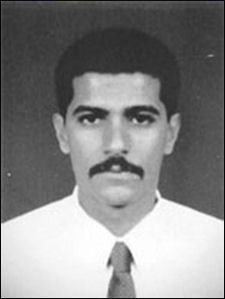
Abdullah Ahmed Abdullah
FBI Most Wanted Terrorist No. 7 Ayaan Hirsi Ali told Global Viewpoint: All this became particularly apparent to me when I observed the contrast of how much attention Western parents pay to their children and their future opportunities. They read all those parenting books, arrange play dates, take them to and from school. That is not the kind of attention these immigrant children get from either of their parents. Most of the parents are just thrown together by family or clan arrangement. "It's time to marry," the parents say, so let's find someone so you can have children. In the hopes of keeping the boys out of trouble, the parents try to get them to marry so they will settle down, thinking responsibility will make them better people. My Western friends who are couples seem to talk endlessly about planning when is the right time for the woman to become pregnant, and how many children it is wise to have. Among Muslim families there is no planning. It just happens. So that just seeds the cycle. I don't agree with those who think Muslims have some kind of plan to take over Europe on purpose by growing so fast demographically in this way. There is no plan. But it is happening spontaneously. [Source: Ayaan Hirsi Ali, Global Viewpoint, June 8, 2010. Ali is a Somali-born women's rights advocate, is the author of "Infidel" and a new memoir, "Nomad: A Personal Journey Through the Clash of Civilizations”]
“Psychologists should take a closer look at this process of identity formation, particularly in Muslim immigrant families where parenting skills are weak. There they will find children who are neglected, particularly boys, and a lot of violence in the family.Of course, one has seen this same dysfunction of weak identity formation in poor minorities in the West, such as inner-city blacks or Hispanics. And there was a lot of drinking, domestic violence and abandonment in Irish immigrant families in the U.S. decades ago. But, again, the difference is that these kids are not exposed to this worldwide movement of jihadism that lures them with the promise of being someone important in a world where no one pays them much attention. Also, the blacks, Hispanics or Irish didn't have parents who encouraged grandiose notions that "you are going to be a hero by being a martyr," or "you are going to become one of the Prophet's disciples."
“I have seen that scene over and over again in my life. The mother and kids are practically helpless. The father is away. That is where these intervention groups, including some Christian ones, come into the immigrant families and show the mother how she is organizing her life in a way that is chaotic and leaves the family powerless over their fate. There has to be some form of care in which the boy can learn to be responsible and learn the skills he needs to make it as a strong and productive individual. But mostly they are not getting that from their parents. If we were talking about 10 or 20 families, it wouldn't be an issue. But we are talking about numerous families that produce dysfunctional children. And that's when the jihadists step in to coach them.”
Roots of Jihadism in Britain
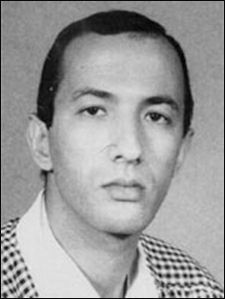
Saif Al-Adel
FBI Most Wanted Terrorist “The Black Album” is a 1995 novel by Hanif Kureishi about the choices Muslims in immigrants have between Muslim extremism and the lures of Western temptations like sex and drugs. Written bu the author of “My Beautiful Landrette” and named after an album by Prince, it is set in the 1980s in late Thatcherite London and is about a teenager in middle class Pakistani family who experiences the world of sex, drugs and rock’ n’ roll but also finds himself attracted to the religion of a devout and hospitable friend. [Source: The Times, July 12, 2009]
Kureishi believes that racism is a factor in making young men become jihadis. He told the Times of London: “What we’re effectively looking at is the transition from anti-racism to fundamentalism. It was crucial not to turn these people into evil caricatures. They form a vigalante group to combat racist attacks, they get people off heroin, they even save the lead character’s life. You can, initially, see their appeal.”
The characters in “The Black Album” are based on research Kuerishi did in the early 1990s visiting mosques in the Whitechapel and Sheperd Bush neighborhoods in London. Kureishi told the Times: “I actually liked a lot of the kids I met in these mosques. They seemed moore naive and innocent and silly than they were dangerous, and their argumenst were just daft. Fundamentalsim gave them a sense of place, of belonging. Many were unemployed, most had friends involved in drugs; religion kept them out of trouble. And many were very hospitable. They’d greet me with a tie, or a pair of cufflinks, and a copy of the Koran...They were just like other students, arguing about the revolution in their front rooms... But there were also guys who would blow you up as soon as look at you, people I really despised. They were ones making fervent speeches in the mosques about gays and women and Jews and Hindus and so on. You really would want to have a long bath after meeting them... I used to sit in the mosques and make notes, writing down their speeches, which would infuriate the...Eventually some of them discovered that I was a friend of [Salam] Rushdie’s. That’s when I was thrown out of the mosque.”
Radical Jihadism Is Not a Mental Disorder
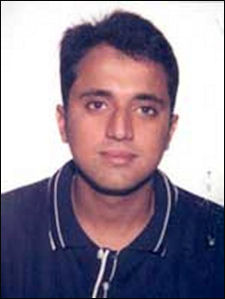
Adnan G. El Shukrijumah
FBI Most Wanted Terrorist No. 9 In 2002, at the age of 15, Omar Khadr threw a grenade that killed a special forces medic during a firefight in Afghanistan. The Toronto-born son on an alleged Al-Qaida financier, he stood trial in the first American tribunal for a child soldier since World War II. His was the first Stephen N. Xenakis wrote in the Washington Post: Prosecutors from the military and the Justice Department built their case against Khadr largely on testimony from their expert witness, forensic psychiatrist Michael Welner, who is developing the Depravity Scale, a tool that is intended to help juries judge the heinous or evil nature of a crime. During the trial...Welner depicted Khadr as a continuing risk to society. "In my professional opinion, Omar Khadr is at a high risk of dangerousness as a radical jihadist," Welner said. Based on hundreds of hours of reviewing records and interviewing witnesses, and 7 to 8 hours of examining the prisoner, the doctor said he concluded that Khadr was a radical jihadist who was at risk of inspiring others to violent acts in the future. [Source: Stephen N. Xenakis, Washington Post, December 5, 2010]
“But radical jihadism is not a clinical condition,” Xenakis wrote, “and diagnosing it is not within the domain of psychiatric experts. Radical jihadism is an ideology - and can be embraced by the psychiatrically sane and insane alike. Beyond being simply unscientific, however, the testimony had another troubling aspect. Welner relied, in part, on the research of a particularly egregious source: Danish educational psychologist Nicolai Sennels.
Welner noted that there are few academic or medical sources on the "future dangerousness" of "radical jihadists who have been apprehended and detained." Sennels, he said, is an exception. Welner described the lengthy conversation the two men had held and said his perspective was informed in part by Sennels's research on Muslim youth whom he treated as a prison psychologist. But Welner wasn't familiar with all of Sennels's written work. As the defense explained during cross-examination, Sennels is also known for inflammatory views on Islam, having claimed that "massive inbreeding within the Muslim culture during the last 1,400 years may have done catastrophic damage to their gene pool." Sennels has described the Koran as "a criminal book that forces people to do criminal things." Welner specifically repudiated these views in court.
In making its case against Khadr, the government relied on Welner's professional status as a forensic psychiatrist to put a scientific sheen on what were essentially lay opinions. The prosecutors depicted Khadr as a probably violent and radical charismatic leader. He had pleaded guilty to murder (albeit in a firefight when he was 15), was a devout Muslim and was well-liked by both detainees and guards, so he had to be dangerous. Through testimony disguised as expert psychiatric opinion, the prosecution portrayed Khadr as having "marinated" in jihadi thinking before and during his long internment at Guantanamo, and described him as a "rock star" who, as the son of a close lieutenant of Osama bin Laden's, enjoyed the adulation of other detainees.
Jihadist's Self-Portrait: Alone and Seething
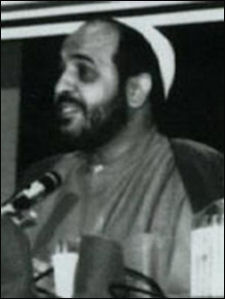
Abd Al Aziz Awda
FBI Most Wanted Terrorist No. 10 The New York Times reported: In a small house outside the city of Peshawar in northwestern Pakistan, a 25-year-old man from the suburbs of London chronicled his personal holy war in the pages of a diary. March 10, 2005. "All alone in a strange land," he writes. "I can trust no-one except Allah." March 26. Questions how fellow Muslims can live peacefully in London when the "kufr," or unbelievers, have turned every corner of the globe into "a battlefield for the Muslims." Calls London the "vital organ of the minions of the devil." April 5. Vows to make "an all out immense effort" to "rejoin my contingent."[Source: David Rohde and Mohammed Khan, New York Times August 9, 2005]
David Rohde and Mohammed Khan wrote in the New York Times: “What specific operation the man, Zeeshan Siddique, was preparing for is unclear. One month later, Pakistan security forces arrested him at the house after receiving reports that he was acting suspiciously. Inside, according to a Pakistani security official, investigators found an electrical circuit that could be used as a bomb detonator; a desktop computer that contained aeronautical mapping and other programs; and the cryptic 35-page diary, typed in English. The Pakistani official said he believed that Siddique was waiting to be dispatched as a suicide bomber. Phone numbers found with Siddique have been traced to known members of Al Qaeda, as well as British extremists involved in a failed plot to detonate bombs in London in 2004, the investigator said. Siddique denies having played any role in the failed 2004 plot.
Based on the diary entries, he quickly grew uncomfortable, even contemptuous, of those around him after arriving at the house near Peshawar in early March. "I can't live in filth unlike u animals" he writes on March 8, calling a group of Pakistani neighbors "dirty geezers" and a Pakistani store owner a "monkey con artist." He suffers bouts of diarrhea and is unhappy with his hideaway, which has no running water. In the same entry he also notes that a person he contacted over the Internet "seemed 2 be chickening out." He fears he is being "conned," and is running out of money. On March 10 he complains of isolation and not speaking the local language. "Im constantly laughed at & ridiculed," he writes.
Siddique has told investigators that he is from the London suburb of Hounslow and is a Muslim of Indian descent. Efforts to locate his family in Hounslow were unsuccessful. The only traces of his former life are school records and a single clipping from a Hounslow area newspaper.The article, from November 1997, quotes the police as saying that Siddique, 17 years old at the time, "ran off to join the mujahedeen" in Lebanon. He returned to his "frantic parents" one month later, the article says. It says he suffered from "a depressive illness."
After the British press reported his possible link to the London bombings last month, officials in Hounslow issued a statement saying he was an "ordinary, average" student at Cranford Community College there from September 1992 to July 1997. But officials also say they believe that he befriended another student at Cranford, Asid Muhammad Hanif, who blew himself up in the suicide bombing of a Tel Aviv nightclub in 2003. "We think they were friends," said Philip Sutcliffe, a Hounslow government spokesman.
Activities and Thoughts of a Lonely Jihadist
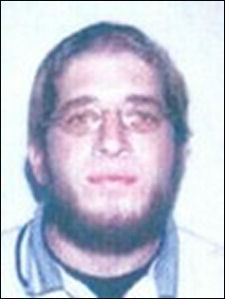
Jehad Serwan Mostafa
FBI Most Wanted Terrorist David Rohde and Mohammed Khan wrote in the New York Times: Siddique has told interrogators that he first traveled to Pakistan in February 2003 with a British Muslim who was one of eight men later arrested in connection with the failed 2004 London bombing plot.
He also said he had spent two and a half months in Lahore, Pakistan, with Mohammed Junaid Babar, a Pakistani-American computer programmer from New York City, according to the Pakistani security official. Babar pleaded guilty last year to charges of supplying military equipment to a Qaeda training camp in Pakistan and working to aid the failed 2004 London plot. [Source: David Rohde and Mohammed Khan, New York Times August 9, 2005]
While denying involvement in the two plots, Siddique has told interrogators that he spent the past two years fighting in Afghanistan and Kashmir.His diary offers little sense of what initially drove him to extremism, but abounds with examples of how he views the world through a radical lens. He rails about Pakistanis who "claim 2 b Muslim" but "don't get it thru there thik heads" that it is their "fard," or religious duty, to help him wage his holy war.
On March 11, he visits people whom he identifies by code name and learns "bad news." "The relaxing place was done over," he writes, and "7-8 of the guys taken whilst asleep." "Told guys need 2 make a move soon," he writes. "Cant stik round." On March 15 Siddique is told "the situation is really bad" and he should "just sit tight & wait it out until things get a bit better." Over the next week he gardens, listens to BBC radio news broadcasts and rejoices at the death of "Yankee pigs" in Iraq and Afghanistan.
He sees himself as a valiant defender of a faith under siege. "Indeed the kafrs do possess everything at the moment but for how long," he writes on March 23. "Indeed the armies of Islam are coming." On April 5 he complains about endless news coverage of the death of Pope John Paul II and predicts that "Allah will throw him in hell." On April 6 he celebrates the deaths of Prince Rainier III of Monaco and the American Nobel laureate Saul Bellow, whom he called a "Jew boy writer friend of Herzl," apparently a reference to Theodor Herzl, the founder of the Zionist political movement, who died in 1904. "Excellent news," he writes. "May Allah curse them." He seethes the most at Muslims he sees as aiding the West, calling them hypocrites. Pakistan's president, General Pervez Musharraf, is "iblis," or Satan. Prime Minister Ibrahim al-Jaafari of Iraq is "the dog of the hell fire."
When his spirits flag, he bolsters his morale by watching "vids," apparently videos or DVDs from the "bros," or brothers, in Iraq. Siddique has told interrogators that he misses his parents in Britain, according to the Pakistani security official. But he believes that the only way he can spend eternity with them is by becoming a martyr. "Do not waver or become weak," he writes in one of his last diary entries. "This is the only way I can be reunited with Mummy and Daddy."
Thirteen-Year-Old Somali Orphan Lured Into Being a Suicide Bomber
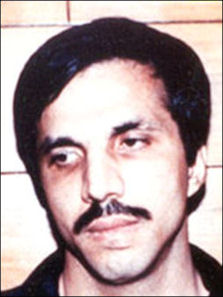
Abdul Rahman Yasin
FBI Most Wanted Terrorist Robyn Dixon wrote in the Los Angeles Times: “When his parents were killed in a rocket attack, the only person to show a lonely Somali boy named Abdi any kindness, or say a caring word, was a family friend named Abdufazil. The man bought him meat and camel milk. Then he sent the 13-year-old to a training camp to become a suicide bomber. Abdufazil was a commander of the militant Islamist militia Shabab in Mogadishu, Somalia's capital, and he told the boy that Christians had killed his parents. He and other Shabab fighters urged him to take revenge for the attack. "I wanted to do it," said Abdi, a slight, awkward boy with large round eyes and shabby, too-small clothes. [Source: Robyn Dixon, Los Angeles Times, November 11, 2011]
“Lying on his thin mattress in the camp in southern Somalia last year, the yearning for his parents was so deep that it hurt. He longed for someone to love and protect him. "I used to wake up and think of my parents and remember that I was alone," said Abdi, whose surname is not being used, to protect him from possible reprisal. "That was the first thing I would think every day." He had one constant companion. "Death would always be there," he said. "I was always afraid of death. I was always thinking, 'When will I die?' "
“The boy often feels out of place, and can't help showing it. He lowers his eyes and fiddles with his hands as he tells his story, or stares numbly ahead. Abdi, who has never been to school, was molded by his mentor, Abdufazil, whose Shabab group is fighting the Western-backed transitional government in Somalia, and the African Union forces who protect it, often by shelling civilian neighborhoods indiscriminately.
“Abdi's parents were sleeping when their house in the Huruwa neighborhood of Mogadishu was shelled in 2009. He believes the African Union forces, known as AMISOM, were responsible. The largest backer of AMISOM is the United States, which has designated the Shabab a terrorist group. After his parents' deaths, Abdi was homeless for a month. Abdufazil, who knew the family, took him in to cook for a Shabab unit based in a large vacant building in Mogadishu. "He used to buy things for me. He used to get me delicious food, special food from outside the camp. It was meat and camel milk. He used to speak to me in that kind way. He would tell me, 'You're a good man.' It made me feel good and boosted my spirits." But Abdufazil and other Shabab fighters also told Abdi that he must seek revenge. They gave him a pistol to defend himself, and showed him how to use it. "I was always afraid to carry the gun," he said.
Recruiting and Training of Teenage Suicide Bombers

Adam Yahiye Gadahn
FBI Most Wanted Terrorist “Most young Shabab fighters trained in Somali terrorist camps... like Abdi, were recruited in Somalia, but many also are from Kenya and neighboring countries. Young Kenyans, some converts to Islam from Christianity, are given a cellphone and $5,000 to join the Shabab, along with a promise that their families will get the same amount monthly, said Phyllis Muema, director of the Kenya Community Support Center, a not-for-profit group in the Kenyan coastal city of Mombasa that works on rehabilitating Somali fighters After they join, the recruits' phones and ID cards are taken and some families never hear from them again. The families are told that their sons have been killed, said Sheik Juma Ngao, a moderate imam in Mombasa, who said young people were used as cannon fodder in battles. "They teach them to kill," Ngao said during a recent visit to Nairobi. "The youths are just duped, and when they go there they're militarized. It isn't easy to escape. If they try to come back to their country, they're killed."
“In 2010, Abdi was sent with 90 other young recruits for training in the south. He still had to cook for the group, but he was also trained to die. About 15 of them were chosen to be suicide bombers, and taught how to drive. The others were trained to be fighters and to use explosives. The first week of the suicide bomber training, they watched videos every day from Somalia and Arab countries. "I used to be frightened watching it. It was all about suicide bombings and death," Abdi said. In the videos he saw two suicide bombers loading vehicles with explosives, driving them into targets and blowing themselves up. After the first week, they watched videos every other day.

Ahmad Ibrahim Al-mughassil
FBI Most Wanted Terrorist “They were taught how to blow things up, make explosive devices and lay booby traps on roads. The training terrified him. Spies in the camp listened for the whispers of defection. There was a fence, and guards. The commanders were harsh, not fatherly like Abdufazil. "If they caught you talking about running away, they would kill you," Abdi said. They said: 'You have to die. You have to sacrifice your life because these guys killed your father and mother. They will kill your people, so before that happens you have to sacrifice yourself and kill them.' "Whenever they talked about the death of my father and my mother, I used to get that courage. I said, 'OK fine, I'll do it.' "But on the other hand, I was afraid of dying. I was very young, too young to die. I wanted to live."
“One day he learned that four boys from one neighborhood, forced to join the Shabab, were planning to escape. They recruited Abdi, because as the cook he could move around the camp without suspicion. They delegated the most dangerous part to him: stealing guns they could sell to pay for the journey to Nairobi, out of reach of the Shabab. If the militia caught them, they would be beheaded for deserting.
“He managed to steal two pistols on a Muslim holiday, one of the few days when the recruits were allowed out of the camp. They sold the weapons for $100 to some livestock traders who were on their way to a market in northern Kenya. They walked to the border with the traders, and paid $10 each in bribes to cross. The boys took another $10 each and separated. Finally, Abdi got to Nairobi. Muema, of the Kenya Community Support Center, said returnees face such rejection, alienation and police harassment that they often go back to the Shabab in Somalia. "They miss those guns," she said. "They're used to being in a war zone."
Suicide Bombers Who Chickened Out

Ali Saed Bin Ali El-Hoorie
FBI Most Wanted Terrorist Michael Jacobson wrote in the Washington Post: On December 10, 2001, “after completing his al-Qaeda training in Afghanistan and Pakistan, Sajid Badat returned home to Britain. Badat, a 22-year-old Muslim born in Gloucester, had an associate, a gangly man named Richard Reid, and the duo were now ready to carry out their mission: blowing up two separate aircraft traveling from Europe to the United States. Badat and Reid had been given identical explosive devices, specially designed to evade airport security and destroy an aircraft in mid-flight. On Dec. 22, Reid — now infamous as the "shoe bomber" — was jumped by his fellow passengers when he tried to light his device on an American Airlines flight from Paris to Miami. He got further than Badat, who simply bailed on the plot, leaving his dismantled bomb in his parents' house. [Source: Michael Jacobson, Washington Post , March 23, 2008; Jacobson is a former staff member of the 9/11 commission and a senior fellow at the Washington Institute for Near East Policy]
“Badat is now serving a 13-year sentence in a British prison. He told prosecutors that he decided to "get away from danger and introduce some calm in his life." Badat's case sheds some light on a rarely considered question: Why do some terrorists drop out? We rightly think of al-Qaeda and other jihadist groups as formidable foes, but the stories of would-be killers who bail give us some intriguing clues about fault lines that counterterrorism officials should exploit. The reasons for a change of heart can be strikingly prosaic: family, money, petty grievances. But they can also revolve around shaken ideology or lost faith in a group's leadership.
One “reason bad guys bail out is money. Like the rest of us, some terrorists see inadequate compensation as a sign of unfair treatment. Fadl, the Sudanese radical, fumed over his salary while al-Qaeda was based in Sudan and began embezzling funds -- stealing approximately $100,000 from bin Laden, according to his testimony in the embassy bombings case. (When bin Laden got wind of Fadl's theft, he ordered Fadl to repay the money; after forking over about $30,000, Fadl fled, fearing retribution.)
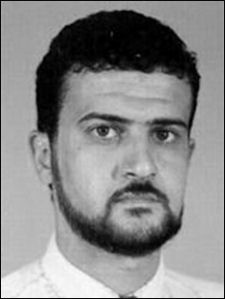
Anas Al-Liby
FBI Most Wanted Terrorist “Don't forget the role of petty slights, either. Kherchtou grew bitter after a bin Laden aide turned down his request for $500 to cover the costs of his wife's Caesarean section -- and grew livid when al-Qaeda subsequently paid the expenses of a group of Egyptians sent to Yemen to renew their passports. "If I had a gun," Kherchtou later testified, "I would shoot [bin Laden] at that time."
“The final factor seems to be good old family ties. Terrorists who maintain contact with friends and family outside their cell or organization seem more likely to drop out. This may be why Atta forbade the 9/11 hijackers to contact their families to say goodbye. The wobbliest of the hijackers, Jarrah, resisted al-Qaeda calls to cut his ties with his fiancee in Germany and his family in Lebanon, souring his relationship with Atta, according to the 9/11 commission.
“Something similar happened to two would-be 9/11 plotters, Rashid and Hamlan. Both men bailed out when they left the fanatical, insular atmosphere of the Afghan training camps and returned home to Saudi Arabia. After getting a visa to enter the United States, Hamlan contacted his family, despite clear al-Qaeda instructions to the contrary. He found out that his mother was ill and decided not to return to Afghanistan, despite intense pressure from his handlers. Hamlan later moved back in with his parents and returned to college. Similarly, Badat, the would-be shoe bomber, appears to have decided to abandon the plot once he returned to Britain and resumed contact with his family.”
Image Sources: FBI
Text Sources: New York Times, Washington Post, Los Angeles Times, Times of London, The Guardian, National Geographic, The New Yorker, Time, Newsweek, Reuters, AP, AFP, Wall Street Journal, The Atlantic Monthly, The Economist, Global Viewpoint (Christian Science Monitor), Foreign Policy, Wikipedia, BBC, CNN, NBC News, Fox News and various books and other publications.
Last updated July 2012
